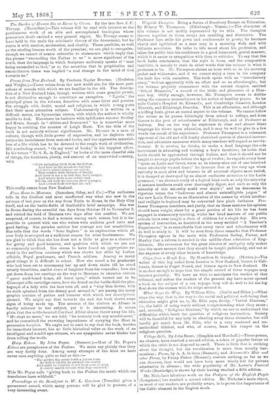Poems from New Zealand. By Frederic Napier Broome. (Houlaton and
Wright.)—These voices from the new world are, for the most part, echoes of sounds with which we are familiar in the old. The descrip- tion of a New Zealand lake, though written with some graphic power, is not distinctive enough to constitute an exception. " Egeria," the principal piece in the volume, describes with some force and passion the struggle with doubt, moral and religious, in which young poets find their most attractive subject. Unfortunately it is written in a difficult metre, the Spenserian stanza, with which the author is wholly unable to deal. Elsewhere he imitates with indifferent success Shelley and Keats, though in "Albion and Rosamond" he is somewhat more happy in catching the manner of Leigh Hunt. Yet the title of the book is not entirely without significance. Mr. Broome is a man of culture, though with little power of expression, and he deplores with pathos his banishment from men and books, and the oppressive material- ism of a life which has to be devoted to the rough work of civilization. His concluding sonnet, " On my want of books," is his happiest effort. In his verses "To S. B., in England," he looks at the more cheerful side of things, the freshness, plenty, and content of an uncrowded country, 'with
"Corn springing thick from the fallow, And kine in the meadows full-fed, And faces where famine sat sallow, That redden with fullness of bread And there is not a mouth that Lath hunger, And winter finds none coldly clad, Till the old with the seasons grow younger, And sorrow finds few that are sad."
This really comes from New Zealand.


































 Previous page
Previous page